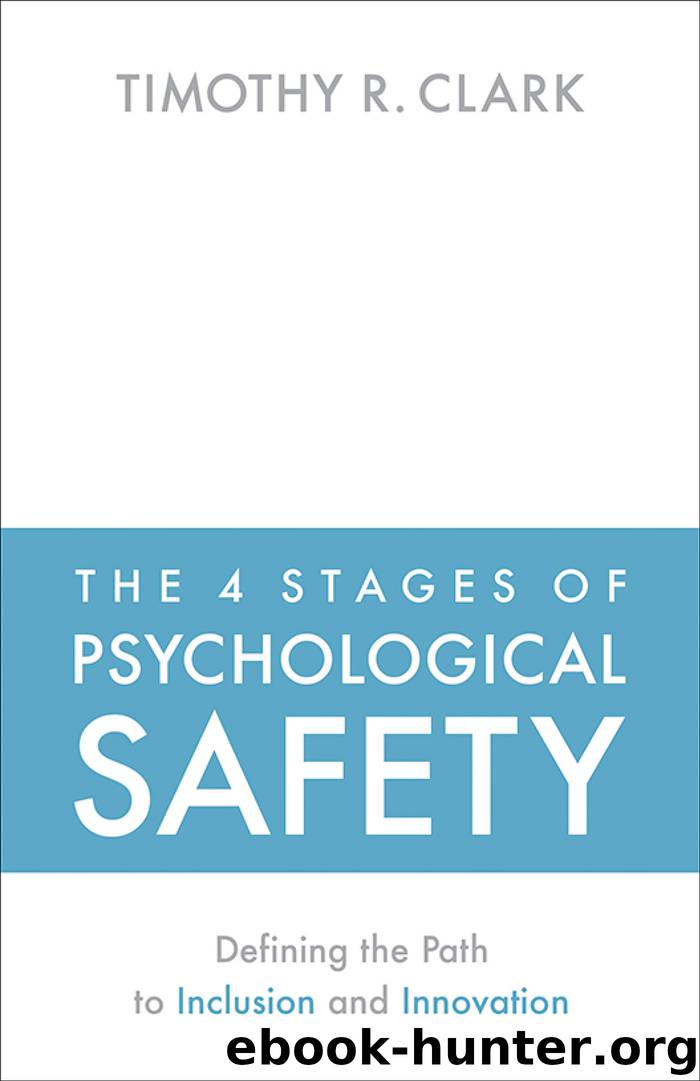The 4 Stages of Psychological Safety by Timothy R. Clark

Author:Timothy R. Clark
Language: eng
Format: epub
Publisher: Berrett-Koehler Publishers
Published: 2020-03-13T16:00:00+00:00
Three Levels of Accountability
The autonomy-for-results exchange that defines contributor safety is an exchange that increases in scale and scope as the individual learns to contribute more. The granting of contributor safety follows a consistent pattern in which the social unit gives autonomy based on three levels of accountability—task, process, and outcome (table 5).
Table 5 The Three Levels of Accountability
3. Outcome
2. Process
1. Task
If we consistently perform well at one level, the organization is inclined to advance us to the next. Let me illustrate from my own illustrious career as a teenager. My first job was to pick apricots in a large orchard in Cupertino, California. I would carry two metal pails to the trees, fill them up with apricots, and then bring them back to the foreman, who would pour the apricots into wood crates. Two full pails would fill a one-bushel crate. I was confined to task work in this job and never graduated to process work.
In high school, I found a summer job on a grounds crew. We spent each day manicuring the grounds of homes and businesses. As soon as I learned the tasks, my boss elevated me to process-level accountability. We would mow, trim, and edge the grass, weed and turn up the flower beds. He delegated more responsibility as we demonstrated the skill and willingness to perform the work at the process level. Eventually, we graduated to outcome level accountability when he felt confident that he could drop us off at a property and say, “Make it look great. I’ll be back to pick you up in two hours.”
As we move to outcome accountability, how we get our work done, how we accomplish our tasks, and how we manage projects and processes doesn’t matter so much. It’s about the outcome. When I enrolled in graduate school, the new doctoral students were invited to a meeting the first week. I can still remember listening to the vice chancellor hold forth about the mysteries of this ancient institution. I can’t remember anything he said except one thing that is forever emblazoned in my memory. After his long speech, he said, “Please understand that only one in three of you will successfully complete the doctorate. The rest of you will either quit or fail. Welcome to Oxford University!”
At that moment, I seriously considered taking a bus to Heathrow and getting on a plane back to the States. Fortunately, I did stay and learned that he had not exaggerated. I also learned that the Oxford model of accountability was a pure outcome model. They granted guided autonomy with the expectation that you would make an original contribution to knowledge in your field. They were very serious about this, and my academic adviser was the embodiment of this model. He was quite willing to help me but would agree to meet only if I had something to show him. There was guidance, but no handholding, no coddling, and most importantly, no shortcuts.
Key concept: The exchange of guided autonomy for results is the basis of human performance.
Download
This site does not store any files on its server. We only index and link to content provided by other sites. Please contact the content providers to delete copyright contents if any and email us, we'll remove relevant links or contents immediately.
Rewire Your Anxious Brain by Catherine M. Pittman(17608)
Talking to Strangers by Malcolm Gladwell(11927)
The Art of Thinking Clearly by Rolf Dobelli(8882)
Mindhunter: Inside the FBI's Elite Serial Crime Unit by John E. Douglas & Mark Olshaker(7861)
Becoming Supernatural by Dr. Joe Dispenza(7131)
Change Your Questions, Change Your Life by Marilee Adams(6675)
The Road Less Traveled by M. Scott Peck(6661)
Nudge - Improving Decisions about Health, Wealth, and Happiness by Thaler Sunstein(6651)
The Lost Art of Listening by Michael P. Nichols(6496)
Enlightenment Now: The Case for Reason, Science, Humanism, and Progress by Steven Pinker(6425)
Win Bigly by Scott Adams(6334)
Mastermind: How to Think Like Sherlock Holmes by Maria Konnikova(6265)
The Way of Zen by Alan W. Watts(5818)
Daring Greatly by Brene Brown(5669)
Grit by Angela Duckworth(4754)
Big Magic: Creative Living Beyond Fear by Elizabeth Gilbert(4745)
Men In Love by Nancy Friday(4355)
Flow by Mihaly Csikszentmihalyi(4072)
The Four Tendencies by Gretchen Rubin(4036)
